#Battle of Auerstedt
Text
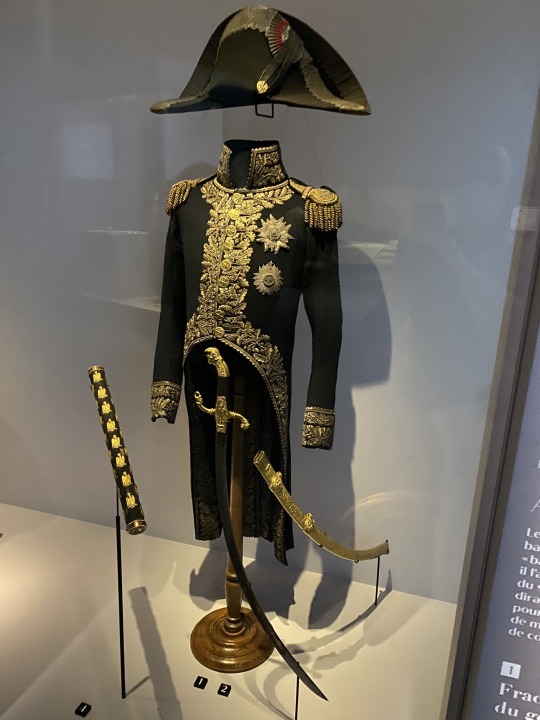
Marshal Davout. Uniform, bicorne worn at the Battle of Auerstedt in October 1806, officer's luxury saber & baton. Exhibition Hotel de la Villette, Paris, 2021
Source: Jésus Chapela Rey
#Marshal Davout#davout#Louis-Nicolas Davout#uniform#military#military uniform#napoleonic era#19th century#first french empire#napoleonic#battle of auer#Battle of Auerstedt#battle of Jena-Auerstedt#jena#battle of Jena#4th coalition#war of the 4th coalition#french empire#napoleon#napoleonic wars#france#empire style#men’s fashion#fashion history#historical fashion#battle#bicorne#embroidery#history#history of fashion
136 notes
·
View notes
Text
Blücher: My queen, we've made a map of all of the possible places where king Frederick William III. could be.
Luise:
Luise: This is a map of all of Europe.
Blücher: Yeah, honestly, we've got no idea where he might be.
#history meme#Napoleonic Wars#General Blücher#Queen Luise#Queue post#for context: Frederick disappeared after the battle at Auerstedt for several days#edit: this was supposed to be added to the queue oops oh well
21 notes
·
View notes
Text
Analysing the Quality of Napoleon's Marshals With Silly Data Science
Let's talk numbers and laugh at funny graphs with missing data!

Other people in this fandom do really lovely detailed information posts, I do weird fanfic, dragon shitposting, body pillow design shitposting and run a stupid Lannes ask rp blog. But! I'm also a programmer with an interest in Numbers, and today we're going to Analyse These Dead Frenchmen with a bunch of screenshots of graphs.
Ethan Arsht published a really interesting article called Napoleon was the Best General Ever, and the Math Proves it., where using data scraped off Wikipedia articles, he creates a statistical model drawing from multiple variables per battle to calculate How Good A General Is At Winning.
Give the article a read, it's great stuff, but if you don't feel like it, he basically applies WAR - "Wins Above Replacement" - which is a value from baseball that measures how many wins a player is worth when compared to a replacement.
So the general's WAR would be how well they compare to a completely average general who replaced them. Yes, as Arsht says, "in other words, I would find the generals’ WAR, in war."
But as he says, this is not a stringent historical analysis and is more of a fun thought experiment. Wikipedia is probably the most comprehensive dataset on this topic that he had access to, but it is Wikipedia the crowdsourced online encyclopedia, so it is going to have holes and inaccuracies. And this was written seven years ago, and the data was collected then, so any updates to these articles since then wouldn't be reflected.
And it's not a perfect model that takes into account everything - it's an approximation, a whole bunch of number crunching. I haven't looked too deeply into how the numbers work exactly, even though I could.
I think that 0 would be "completely and utterly average"? A positive WAR is good, a negative WAR is not. Napoleon is the best general ever at 16.679 WAR, the next highest is Caesar at 7.445 WAR.

(Link, you can hover over each battle and look at each datapoint!)
But I'm interested in Napoleon's marshals. The 26 men he raised up to military nobility! The dramatic assholes who kept arguing with each other. I'll post links for all of them at the end of this, but I won't be screenshotting each of their WAR graphs, just a few.
I'm not entirely sure how the scraper collected the information about what battles a commander is considered in "charge" of - I tried looking at the provided code repository but I am reminded that data science people bless them are not really good at structuring or publishing code and why are all the html pages just straight up saved in the root folder why are the jupyter notebook outputs just uncleared aaaaaaaaaaaaaaa
Oh yeah this was scraped from seven years ago so current wikipedia pages won't be reflective of what's on the graphs - so we can assume that this is just grabbing stuff from the "Commanders and leaders" part from each individual battle page and collating them into numbers
Anyway let's look at the iron man himself, Davout, considered to be the best of Napoleon's marshals.

(Link)
Heh, here we see the first hole in the dataset - Jena-Auerstedt is considered to be one battle, and Napoleon would like you to think that's the case.
Anyway, pretty good! Let's look at Jean Lannes, the lively Gascon
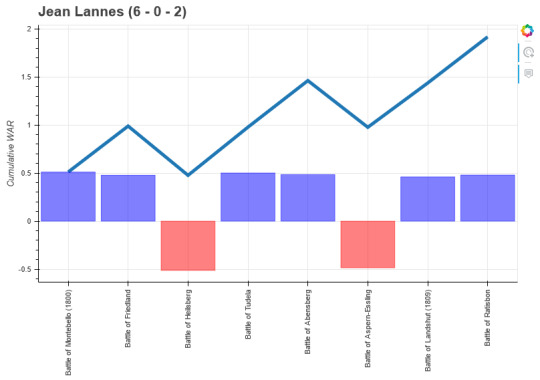
(Link)
Oooooh, even better than Davout! Helps he didn't go to Russia. Wait, why is Aspern-Essling dated to before Ratisbon, especially when Lannes died in the former?
Let's look at André Masséna, also known as being pretty cool:
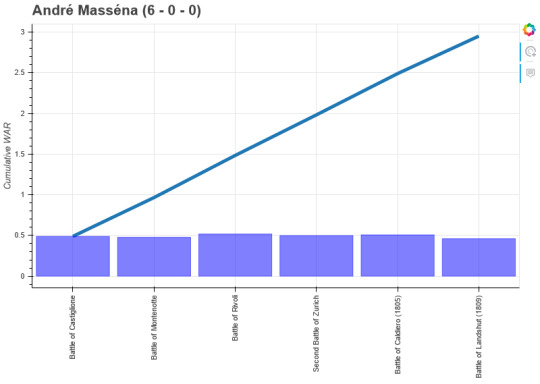
(Link)
Damn, neat, though I think there's a lot of omissions here.
Here's Murat:
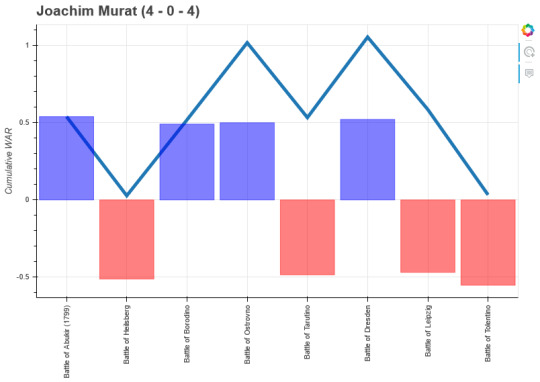
(Link)
Lol Tolentino, I do like how Murat Peaked there a little bit
But we're forgetting a certain redhead, aren't we?

(Link)
Ouch. But also Waterloo not appearing there, hmmm.
Anyway let's finish off the screenshots with Napoleon's greatest strategist, Jean-de-Dieu Soult, the man that Wellington called a master of the defensive!

(Link)
honestly this is the entire reason why i wanted to write this post
in soult's defense - as a soult defender - he had a pretty shitty army full of conscripts, was isolated, was occasionally pretty bad at adapting tactically to new surprises and had to deal with the english being stubborn fuckers, but he was brilliant in setting things up strategically and forcing the english to catch up through a fighting retreat with a demoralised army, stopping them from closing in on france too
but also the way this graph bullies soult so hard makes me laugh a lot
Anyway, yeah, these graphs are definitely inaccurate and I'm also posting these to see the Napoleonic community on tumblr's reaction to them, but they are a fun way to engage with history!
Just don't take them seriously, and feel free to argue in the tags/comments/reblogs
I could theoretically use this guy's code to rerun this just for the Marshals now - I know my way around some data science code - but I do have a lot on my plate, but it would be a fun experiment!
Marshal WAR Graph Links
Note: So these are under the Wikipedia article names at the time that the web scraper was run seven years ago so some of these names turned out to be different from what they are now and I had to do a bit of digging to fix some
you can definitely tell that the information is incomplete on a lot of these, again i repeat the information was scraped off wikipedia seven years ago
Louis-Nicolas Davout
Jean Lannes
Joachim Murat
Michel Ney
André Masséna
Jean-de-Dieu Soult
Bon-Adrien Jeannot de Moncey (one battle lol)
Jean-Baptiste Jourdan
Charles-Pierre Augereau
Jean-Baptiste Bernadotte aka Charles XIV John of Sweden (Two battles and only Swedish ones I think)
Guillaume Brune
Édouard Mortier (two battles)
Jean-Baptiste Bessières (two battles)
François Christophe de Kellermann (one battle, Valmy)
François Joseph Lefebvre (two battles)
Charles-Victor Perrin (ouch)
Étienne Macdonald
Nicolas Oudinot (lol)
Auguste de Marmont (loll)
Laurent de Gouvion Saint-Cyr
Józef Poniatowski (three battles but hmm. pretty bad but feel like there's too much missing info here)
Emmanuel de Grouchy (two battles, can't make a Where's Grouchy joke)
Marshals Without Graphs
Not because they didn't command anything but I couldn't find their graphs on the website or in the code repo
Catherine-Dominique de Pérignon
Jean-Mathieu-Philibert Sérurier
Louis-Gabriel Suchet (wtf? maybe seven years ago the documentation on him was sad)
EDIT: wait i was looking at the notebook (the uh place where the code was being run, to see if i could run the code myself)
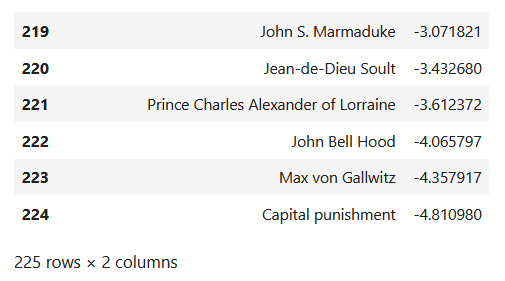
soult is one of the lowest ranked generals overall on this initial list pfftHAHAHhahahahahahahaha
#napoleon's marshals#napoleonic era#napoleonic wars#napoleonic shitpost#cadmus rambles#cad rambles about dead frenchmen on main#jean lannes#louis-nicolas davout#joachim murat#michel ney#andre massena#im not tagging all of them#jean-de-dieu soult
35 notes
·
View notes
Text
There are honestly so many fundamental things about Ridley Scott's Napoleon I disliked, I hardly know where to start so here's just a couple things that popped into my head. All of the disappointed/angry reviews I saw really were on the money with their criticisms. Below the cut a bunch of things in no particular order
Apart from the scenes in Egypt and Elba (which are sepia-tinted) the entire movie is colorgraded with a blue-grey tone like the most painfully dreary wet day in late autumn. Just watching it I got hypothermia. Just take these two shots - the first from the 1970 waterloo movie (highly recommended, can be found for free on youtube), the second from 2023 - to see the difference.
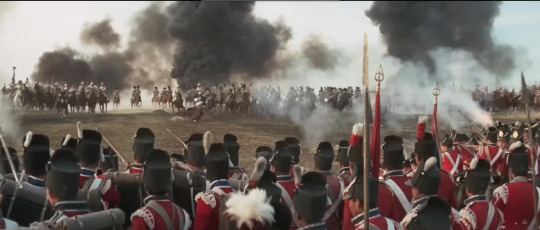
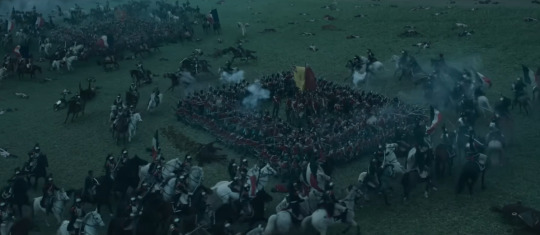
Despite a massive budget and cgi available the battles actually felt incredibly small. The Waterloo scene in particular felt like it was taking place on a patch of grass that was a 100 meters square, with two thin lines of French infantry advancing towards a relatively small group of British infantry dispersed within a couple meters of trenches, with the tents of their camp only meters directly behind that. It gave the entire thing the sense like it was a large reenactment society of maybe 200 people giving it their all, rather than 140.000. The 1970 Waterloo might be 50 years old but showed vastly, vastly more impressive scenes of huge formations of men, offering awe-inspiring cinematography compared to Scott's tiny Waterloo skirmish. I'm perfectly willing to accept disgustingly bad historical accuracy as long as the pictures are sufficiently pretty. They were not.
As a note, in the movie the British infantry inexplicably decides to walk forwards out of their fortified trenchline on the slope (complete with spikes) and form squares in front of it, instead of simply staying inside of their trenches.
There's a fucking sniper at Waterloo. Like, an infantryman with a rifle with a scope on it. He blows a golfball-sized hole in Napoleon's hat.
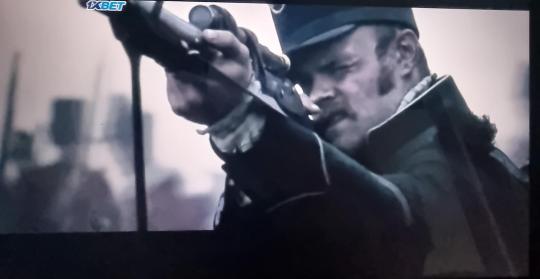
The Marshals - each colorful, fascinating characters many of whom would individually be worthy of their own movie - are less than background characters; I don't think any were even mentioned by name, and there's only two or three that are regularly seen on screen. Marshal Ney, famous, brave, tragic Ney, who has a very distinctive redhead appearance, was rendered completely unrecognizable by adding a moustache.
Phoenix's Napoleon has no charismatic presence whatsoever. Anyone who wasn't already reasonably familiar with Napoleon before seeing this movie would be dumbfounded why so many people followed him at all, or why upon his return from Elba thousands of soldiers sent to stop him simply deserted to his cause as soon as he approached. If you want to create a movie to deconstruct Napoleon from a brilliant national hero to a flawed man there are infinite ways to do so, and they chose the most sub-par by just making him kinda odd and insecure.
Napoleon's military genius is underexplored if not entirely absent from the movie, and to a large extent it simply feels like events are just kinda happening to him, especially with the way short disparate scenes are quickly strung together. One second we're in the aftermath of Austerlitz (1805), and two or three 1-minute scenes we're at the invasion of Russia (1812). Some of Napoleon's finest moments as a general are omitted from the film such as the Italian campaign, Jena-Auerstedt, and the six-day campaign of 1814 where Napoleon so thoroughly outgeneralled his opponent his tiny 30K man army inflicted nearly 30K casualties on enemy forces twice his size over the course of four battles.
Meanwhile his crowning achievement at Austerlitz is reduced to yelling thrice for hidden units to attack and then the entire enemy army flees onto an ice lake fit for a fantasy movie (just check out the ice scene from the 2004 King Arthur) and gets sunk by cannon fire. If you've seen the trailer you've seen almost the entire battle.
Huge parts of the movie are devoted to his marriage to Josephine, which I personally don't find terribly interesting to begin with, and historical events are contorted to be related to his marriage (such as ditching his army in Egypt because she's cheating on him), but it often felt to me like this storyline, such as it was, was firing in certain directions only to abruptly cut them off or let them go nowhere, and the movie seemed unsure whether it was the A-plot or the B-plot or a secret third thing.
Before I forget... not once but twice Napoleon is charging into the thick of the melee on horseback!!! First where he is at the very front of a cavalry charge at Borodino (the 30 seconds of it that we got, which were all in the trailer) and second near the end of Waterloo before making a run for it. And it's so patently absurd! It's like a WW1 movie with Kaiser Wilhelm personally storming the trenches or Emperor Hirohito flying a plane at Pearl Harbor. Napoleon demonstrated plenty of bravery in his life (such as when he was wounded by a bayonet at Toulon, or attempted to lead a charge at the bridge at Arcole) but the Emperor of the French was not at the fucking forefront of a massed cavalry charge with sabre in hand scything down infantrymen.
The movie ends with a card with casualtyfigures from a bunch of battles as if it's a sobering statement at the end of a Holocaust movie, so the Brits can remind you Napoleon was actually Hitler.
#napoleon movie#I've seen bad movies in my life but I've never been so disappointed by one#I wanted it to be good. And it was the opposite.
14 notes
·
View notes
Photo
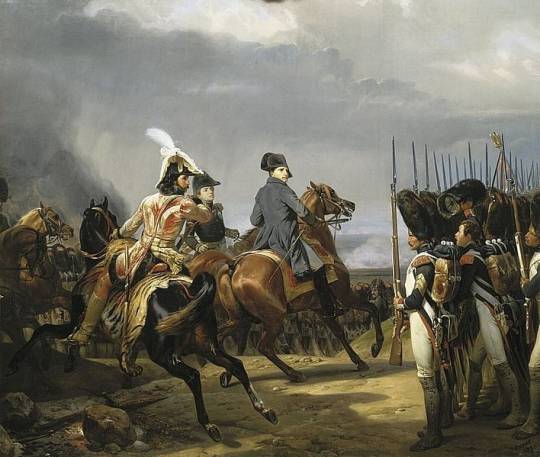
Battle of Jena-Auerstedt
The twin battles of Jena and Auerstedt, both fought on 14 October 1806, marked a major turning point in the Napoleonic Wars (1803-1815). It saw the French Grande Armée, led by Emperor Napoleon I (r. 1804-1814; 1815) soundly defeat the Prussian army of King Frederick William III (r. 1797-1840). The battles resulted in Prussia's subjugation to the First French Empire.
Continue reading...
14 notes
·
View notes
Text
The 20 greatest battles in history:
1. Battle of Marathon (490 BC) - A decisive Athenian victory against Persian invaders, known for the marathon run.
2. Battle of Gaugamela (331 BC) - Alexander the Great's victory over the Persian Empire's King Darius III.
3. Battle of Cannae (216 BC) - A stunning Roman defeat by Hannibal's Carthaginian forces in the Second Punic War.
4. Battle of Tours (732) - Charles Martel's victory over the Umayyad Caliphate, halting Muslim expansion into Europe.
5. Battle of Agincourt (1415) - Henry V of England's triumph over the French during the Hundred Years' War.
6. Battle of Lepanto (1571) - A naval clash where the Holy League defeated the Ottoman Empire's fleet.
7. Battle of Blenheim (1704) - A pivotal battle in the War of Spanish Succession, led by the Duke of Marlborough.
8. Battle of Saratoga (1777) - A turning point in the American Revolution, where the British army surrendered to American forces.
9. Battle of Trafalgar (1805) - Admiral Nelson's British fleet defeated Napoleon's combined French and Spanish fleets.
10. Battle of Gettysburg (1863) - A significant battle during the American Civil War, with a Union victory over the Confederacy.
11. Battle of Stalingrad (1942-1943) - A brutal and decisive battle in WWII, with the Soviet Union defeating Nazi Germany.
12. D-Day (1944) - Allied forces' invasion of Normandy, a critical step in liberating Western Europe from Nazi occupation.
13. Battle of Midway (1942) - A pivotal naval battle in the Pacific theater of WWII, where the U.S. Navy defeated Japan.
14. Battle of Marathon (1918) - A major battle in WWI, marking the beginning of the end for the Central Powers.
15. Battle of Thermopylae (480 BC) - Famous for the last stand of 300 Spartans against the Persian Empire.
16. Battle of Hastings (1066) - William the Conqueror's Norman forces defeated King Harold II of England.
17. Battle of Jena-Auerstedt (1806) - Napoleon's victory over the Prussian and Saxon armies in the Napoleonic Wars.
18. Battle of Guadalcanal (1942-1943) - A crucial WWII battle in the Pacific, where the U.S. gained control of the island.
19. Battle of Actium (31 BC) - Octavian's (Augustus) victory over Mark Antony and Cleopatra, leading to the end of the Roman Republic.
20. Battle of Panipat (1526) - Babur's Mughal forces defeated the Sultanate of Delhi, establishing the Mughal Empire in India.
Here is a brief overview of the battles mentioned earlier, highlighting the protagonists, approximate number of soldiers on each side, casualties, and the victors:
1. Battle of Marathon (490 BC)
- Protagonist: Athenians
- Approx. Soldiers: Athens (10,000), Persians (20,000+)
- Deaths and Injuries: Athens (192 dead), Persians (6,400+ dead)
- Winner: Athenians
2. Battle of Gaugamela (331 BC)
- Protagonist: Alexander the Great (Macedonians)
- Approx. Soldiers: Alexander's forces (47,000), Persians (100,000+)
- Deaths and Injuries: Exact figures unknown, but heavy casualties for the Persians.
- Winner: Macedonians
3. Battle of Cannae (216 BC)
- Protagonist: Hannibal (Carthaginians)
- Approx. Soldiers: Rome (70,000+), Carthage (40,000+)
- Deaths and Injuries: Rome (approximately 50,000 dead), Carthage (around 5,700 dead)
- Winner: Carthaginians
4. Battle of Tours (732)
- Protagonist: Charles Martel (Franks)
- Approx. Soldiers: Franks (possibly 30,000), Umayyad Caliphate (possibly 80,000+)
- Deaths and Injuries: Estimated heavy casualties for the Umayyad Caliphate.
- Winner: Franks
5. Battle of Agincourt (1415)
- Protagonist: Henry V of England
- Approx. Soldiers: England (around 6,000), France (possibly 20,000+)
- Deaths and Injuries: England (fewer than 1,000 dead), France (approximately 6,000 dead)
- Winner: England
6. Battle of Lepanto (1571)
- Protagonist: Holy League (Spain, Papal States, others)
- Approx. Ships: Holy League (about 200 galleys), Ottoman Empire (around 250 galleys)
- Deaths and Injuries: Thousands on both sides, exact numbers vary.
- Winner: Holy League
7. Battle of Blenheim (1704)
- Protagonist: Duke of Marlborough (Grand Alliance)
- Approx. Soldiers: Grand Alliance (about 52,000), Franco-Bavarian forces (around 56,000)
- Deaths and Injuries: Grand Alliance (around 13,000 dead and wounded), Franco-Bavarian forces (around 38,000)
- Winner: Grand Alliance
8. Battle of Saratoga (1777)
- Protagonist: American Continental Army
- Approx. Soldiers: American (around 8,000), British (around 6,000)
- Deaths and Injuries: American (fewer than 500 dead), British (around 600 dead, over 6,000 captured)
- Winner: American Continental Army
9. Battle of Trafalgar (1805)
- Protagonist: Admiral Nelson (British)
- Approx. Ships: British (around 27 ships), French and Spanish (around 33 ships)
- Deaths and Injuries: Thousands on both sides, exact numbers vary.
- Winner: British
10. Battle of Gettysburg (1863)
- Protagonist: Union Army (United States)
- Approx. Soldiers: Union (around 93,000), Confederate (around 71,000)
- Deaths and Injuries: Union (around 23,000 casualties), Confederate (around 28,000 casualties)
- Winner: Union Army
11. Battle of Stalingrad (1942-1943)
- Protagonist: Soviet Red Army
- Approx. Soldiers: Soviet Union (possibly over a million), Nazi Germany (around 800,000)
- Deaths and Injuries: Exact figures vary, but millions of casualties on both sides.
- Winner: Soviet Red Army
12. D-Day (1944)
- Protagonist: Allied Forces (United States, United Kingdom, Canada, and others)
- Approx. Soldiers: Allies (over 156,000 on D-Day), German defenders (approximately 50,000)
- Deaths and Injuries: Thousands on both sides, exact numbers vary.
- Winner: Allies
13. Battle of Midway (1942)
- Protagonist: United States Navy
- Approx. Ships: United States (3 aircraft carriers, various ships), Japan (4 aircraft carriers, various ships)
- Deaths and Injuries: United States (around 300 dead), Japan (around 3,000 dead)
- Winner: United States
14. Battle of Marathon (1918)
- Protagonist: Allied Forces (World War I)
- Approx. Soldiers: Allied Forces (varied by nation), Central Powers (varied by nation)
- Deaths and Injuries: Millions of casualties on both sides.
- Winner: Allied Forces
15. Battle of Thermopylae (480 BC)
- Protagonist: King Leonidas I (Sparta)
- Approx. Soldiers: Spartan-led Greek force (around 7,000), Persian Empire (possibly hundreds of thousands)
- Deaths and Injuries: Spartan-led Greeks (300+ dead), Persians (tens of thousands dead)
- Winner: Persians
16. Battle of Hastings (1066)
- Protagonist: William the Conqueror (Normans)
- Approx. Soldiers: Normans (estimated 7,000-12,000), Anglo-Saxons (estimated 5,000-7,000)
- Deaths and Injuries: Hundreds, exact numbers vary.
- Winner: Normans
17. Battle of Jena-Auerstedt (1806)
- Protagonist: Napoleon Bonaparte (French)
- Approx. Soldiers: French (around 96,000), Prussian and Saxon forces (around 76,000)
- Deaths and Injuries: Thousands on both sides, exact numbers vary.
- Winner: French
18. Battle of Guadalcanal (1942-1943)
- Protagonist: United States Marine Corps
- Approx. Soldiers: United States (around 60,000), Japanese (around 36,000)
- Deaths and Injuries: Thousands on both sides, exact numbers vary.
- Winner: United States
19. Battle of Actium (31 BC)
- Protagonist: Octavian (Augustus) (Roman forces)
- Approx. Ships: Octavian's fleet (around 400 ships), Mark Antony and Cleopatra's fleet (around 500 ships)
- Deaths and Injuries: Thousands on both sides, exact numbers vary.
- Winner: Octavian (Augustus)
20. Battle of Panipat (1526)
- Protagonist: Babur (Mughal Empire)
- Approx. Soldiers: Mughal forces (around 20,000), Sultanate of Delhi (possibly 100,000+)
- Deaths and Injuries: Thousands on both sides, exact numbers vary.
- Winner: Mughal Empire (Babur)
These battles played pivotal roles in shaping history, and the provided casualty figures are estimates, as exact numbers often vary in historical accounts.

2 notes
·
View notes
Text
A quick biographical sketch of Davout
Yesterday I posted “A quick biographical sketch of Berthier”, from the September 2019 issue of Historia magazine. The special topic was Napoleon, and the front page’s title read “Napoleon, les secrets d’un chef de guerre”.
This is the second Marshal on the alphabetical list of the eight highlighted in an article about Napoleon’s ability to spot talent:
Davout, the Invincible One
Born in 1770, this marshal never lost a single battle. And he likes them difficult! At Austerlitz, he contains the majority of the Austro-Russian attack with much smaller forces. His resilience is one of the factors of this success. A year later he achieved a stunning triumph at Auerstedt against an army twice the size of his. This masterwork of the Prussian campaign even made Napoleon envious. In 1809, the Emperor exclaims adiringly: "Look at Davout as he manoeuvres, he is going to win this battle for me once again". In 1815, he is Minister of War, and the Belgian campaign is lost without him. What a mistake it is to leave him in Paris! He is a member of parliament during the Bourbon Restoration, and dies in 1823.
I’ve read that Davout died of tuberculosis, but I’ve read more often that he died of congestive heart failure. Either way, at the time there was no real treatment for either of these diseases, He was just 53 at his death, one of many Marshals to die before reaching the age of 60.
27 notes
·
View notes
Text
Murat, Soult and Ney in Halberstadt (Oct. 19 and 20, 1806)
The best thing about the Prussian campaign is that pretty much every town the French entered has some book mentioning it. Halberstadt is about 130 km North of Jena. Apparently the first refugees of the battle already reached the town on October 16, the Prussian king passed through on October 17.
On 19 October, a Sunday, church services were held despite the unavoidable noise made by disorderly marching [i.e. the Prussians fleeing from Jena and Auerstedt], but when at noon, in front of the Johannis and Harsleber gates, the cannon and shotgun fire of the Prussian guard under General Hirschfeld resounded, who tried to hold back the pursuing French, but finally had to give way to Magdeburg, when three savage-looking chasseurs with drawn sabres and cocked pistols burst through the town reconnoitring, no one dared to go out into the streets anymore.
At 2 o'clock Murat in his well-known fantastic clothes at the head of several cavalry regiments dashed in to the Johannistor and out to the Breitentor in pursuit of the Prussians. He soon returned, had all the letters brought to him from the post office and kept the money deposits; both he and General Bernadotte's ravenous »Löffelgarde« (spoon guard), who had arrived in the course of the afternoon, were quartered.
O come on! Murat didn’t pilfer the letters. He was answering his fan mail!
Despite this, the French roamed the city plundering and abusing the inhabitants, frenetically demanding wine; in the very dark night, they searched the streets for cellar holes and where they noticed one, they broke into the respective house to see if they could not find wine. Since little of this substance fell into their hands except in the cathedral cellar, which they emptied, they soon learned to drink beer. Just as badly as in the town they fared in Wehrstedt, whose fleeing inhabitants caused confusion and unrest the next day.
On 20 October, the ragtag regiments of Marshals Ney and Soult pushed their way in, albeit without looting, but increasing the confusion and hampering the ordinary business of everyone. Ney had 100,000 francs paid out to him and issued an acknowledgement of receipt, stating that the sum would be credited to the principality in the tribute to be paid; on his departure, however, he demanded the acknowledgement back, and it has not been possible to obtain repayment from the French government later.
No, no, I bet that wasn’t really Ney. It probably was Soult, wearing a red wig. 😁
20 notes
·
View notes
Text
Crónica. GA2-240202501-AA1-EV03
INTRODUCTION
"Napoleon Bonaparte: A Revolutionary Figure Who Redefined Power and Shaped an Era"
The life and legacy of Napoleon Bonaparte continue to captivate the world, as he remains one of the most influential and controversial figures in history. Born in Corsica in 1769, Napoleon's journey from a modest upbringing to becoming the Emperor of France is a remarkable tale of ambition, military genius, and political acumen. This chronicle dives into the captivating life of Napoleon Bonaparte, exploring his rise to power, his military conquests, and his lasting impact on Europe.
About Napoleon Bonaparte
Napoleon's story begins on the island of Corsica, a French territory at the time. As a young man, he exhibited exceptional intelligence and leadership qualities, which led to his enrollment at the renowned École Militaire in France. It was there that Napoleon honed his military skills and nurtured his ambition for greatness.
The French Revolution erupted in 1789, setting the stage for Napoleon's meteoric rise. During this turbulent period, he displayed extraordinary military talent, capturing the attention of revolutionary leaders. His strategic victories in Italy and his decisive actions during the defense of the French Directory in 1795 propelled him to prominence.
In 1799, Napoleon orchestrated a coup d'état, overthrowing the weak and unstable government and establishing the Consulate, with himself as First Consul. This marked a turning point in French history and the beginning of Napoleon's transformative rule. Through a series of political maneuvers and military campaigns, he consolidated power and positioned himself as the de facto ruler of France.
Napoleon's military prowess and strategic brilliance became the stuff of legends. From his triumphant Italian campaigns, where he defeated multiple European powers, to his audacious expedition to Egypt, he displayed an unparalleled ability to lead and inspire his troops. The Battle of Austerlitz in 1805 stands as a testament to his tactical genius, solidifying his reputation as one of history's greatest military commanders.
In 1804, Napoleon crowned himself Emperor of the French, signaling a new era of French dominance in Europe. His imperial ambitions extended far beyond France's borders, as he embarked on a series of military campaigns to expand his empire. From the stunning victory at Jena-Auerstedt to the conquest of the Iberian Peninsula, he reshaped the political landscape of Europe.
However, Napoleon's quest for power ultimately led to his downfall. The disastrous invasion of Russia in 1812 marked a turning point in his fortunes, as the harsh Russian winter and guerrilla warfare decimated his forces. Defeated in the Battle of Leipzig in 1813, he was forced into exile on the island of Elba.
But Napoleon's spirit and ambition were not easily extinguished. In 1815, he made a dramatic return to France, known as the Hundred Days. Although he achieved some initial victories, including his famous victory at Waterloo, he was ultimately defeated by the combined forces of European powers and was exiled to the remote island of Saint Helena, where he would spend his remaining years in seclusion.
Napoleon's legacy is complex and multifaceted. On one hand, he introduced numerous reforms, including the Napoleonic Code, which modernized legal systems and promoted equality. He also implemented economic and educational reforms that laid the foundation for modern France. On the other hand, his military campaigns resulted in immense human suffering and political instability across Europe.
0 notes
Text
Events 10.27 (before 1940)
312 – Constantine is said to have received his famous Vision of the Cross.
1275 – Traditional founding of the city of Amsterdam.
1524 – French troops lay siege to Pavia.
1553 – Condemned as a heretic, Michael Servetus is burned at the stake just outside Geneva.
1644 – Second Battle of Newbury in the English Civil War.
1682 – Philadelphia is founded in the Commonwealth of Pennsylvania.
1775 – King George III expands on his Proclamation of Rebellion in the Thirteen Colonies in his speech from the throne at the opening of Parliament.
1795 – The United States and Spain sign the Treaty of Madrid, which establishes the boundaries between Spanish colonies and the U.S.
1806 – The French Army under Napoleon enters Berlin following the Prussian defeat at the Battle of Jena–Auerstedt.
1810 – United States annexes the former Spanish colony of West Florida.
1838 – Missouri governor Lilburn Boggs issues the Extermination Order, which orders all Mormons to leave the state or be killed.
1870 – Franco-Prussian War: Marshal Bazaine surrenders to Prussian forces at the conclusion of the Siege of Metz along with 140,000 French soldiers.
1904 – The first underground New York City Subway line opens, later designated as the IRT Broadway–Seventh Avenue Line.
1907 – Fifteen people are killed in Hungary when gendarmes opened fire on a crowd gathered at a church consecration.
1914 – World War I: The new British battleship HMS Audacious is sunk by a minefield laid by the armed German merchant-cruiser Berlin.
1916 – Negus Mikael, marching on the Ethiopian capital in support of his son Emperor Iyasu V, is defeated by Fitawrari abte Giyorgis, securing the throne for Empress Zewditu I.
1919 – The Fourth Regional Congress of Peasants, Workers and Insurgents is held by the Makhnovshchina at Oleksandrivsk.
1922 – A referendum in Rhodesia rejects the country's annexation to the South African Union.
1924 – The Uzbek SSR is founded in the Soviet Union.
1930 – Ratifications exchanged in London for the first London Naval Treaty go into effect immediately, further limiting the expensive naval arms race among its five signatories.
1936 – Mrs Wallis Simpson obtains her divorce, which would eventually allow her to marry King Edward VIII of the United Kingdom, thus forcing his abdication from the throne.
0 notes
Text
Napoleon Bonaparte
(15th August, 1769 - 05th May, 1821)
Napoleon was born on the island of Corsica, not long after its annexation by France, to a native family descending from minor Italian nobility. He supported the French Revolution in 1789 while serving in the French army, and tried to spread its ideals to his native Corsica. He rose rapidly in the Army after he saved the governing French Directory by firing on royalist insurgents. In 1796, he began a military campaign against the Austrians and their Italian allies, scoring decisive victories and becoming a national hero. Two years later, he led a military expedition to Egypt that served as a springboard to political power. He engineered a coup in November 1799 and became First Consul of the Republic. Differences with the United Kingdom meant that the French faced the War of the Third Coalition by 1805. Napoleon shattered this coalition with victories in the Ulm Campaign, and at the Battle of Austerlitz, which led to the dissolution of the Holy Roman Empire. In 1806, the Fourth Coalition took up arms against him because Prussia became worried about growing French influence on the continent. Napoleon defeated Prussia at the battles of Jena and Auerstedt, marched the Grande Armée into Eastern Europe, and defeated the Russians in June 1807 at Friedland, forcing the defeated nations of the Fourth Coalition to accept the Treaties of Tilsit. Two years later, the Austrians challenged the French again during the War of the Fifth Coalition, but Napoleon solidified his grip over Europe after triumphing at the Battle of Wagram.
Hoping to extend the Continental System, his embargo against Britain, Napoleon invaded the Iberian Peninsula and declared his brother Joseph the King of Spain in 1808. The Spanish and the Portuguese revolted in the Peninsular War, culminating in defeat for Napoleon's marshals. Napoleon launched an invasion of Russia in the summer of 1812. The resulting campaign witnessed the catastrophic retreat of Napoleon's Grande Armée. In 1813, Prussia and Austria joined Russian forces in a Sixth Coalition against France. A chaotic military campaign resulted in a large coalition army defeating Napoleon at the Battle of Leipzig in October 1813. The coalition invaded France and captured Paris, forcing Napoleon to abdicate in April 1814. He was exiled to the island of Elba, between Corsica and Italy. In France, the Bourbons were restored to power. However, Napoleon escaped Elba in February 1815 and took control of France. The Allies responded by forming a Seventh Coalition, which defeated Napoleon at the Battle of Waterloo in June 1815. The British exiled him to the remote island of Saint Helena in the Atlantic, where he died in 1821 at the age of 51. Napoleon had an extensive impact on the modern world, bringing liberal reforms to the many countries he conquered, especially the regions of the Low Countries, Switzerland and parts of modern Italy and Germany. He implemented many liberal policies in France and Western Europe.
(Information From Wikipedia)
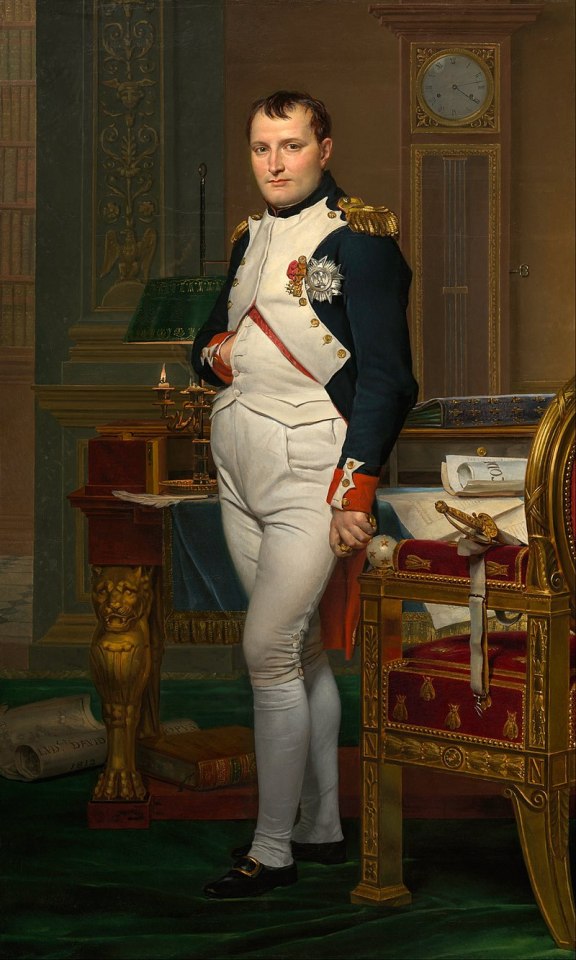
0 notes
Text
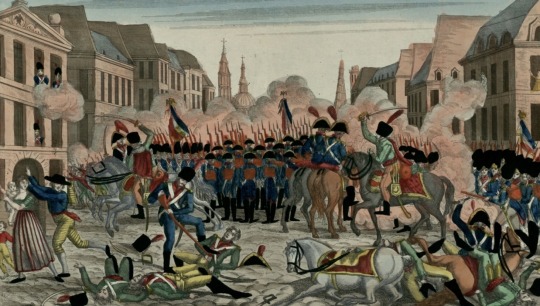

Scenes from the War of the 4th Coalition
Capture of Lübeck on 6 November 1806 by French army, engraving
Famous battle of Weimar [battle of Jena and Auerstedt] by the French troops, under the title: “Great trait of generosity from the Emperor of the French and King of Italy Towards 6000 Saxons and their Officers, October 15, After the Battle of Weimar.”
(Paris chez Basset, Marchand d'Estampes et Fabricant de Papiers peints, rue Saint Jacques au coin de celle des Mathurins)
#War of the 4th Coalition#war of the fourth coalition#napoleon#napoleonic era#napoleonic#napoleon bonaparte#first french empire#french empire#Prussia#french history#prussian history#france#history#19th century#engraving#battle of Lübeck#Lübeck#battle of Lubeck#lubeck#jena#battle of Jena#1800s#art#coalition wars#Germany#coalitions
8 notes
·
View notes
Note
I think the anon that asked about Frederick William III was talking about the Battle of Auerstedt. According to one thing I read, Freddie Will #3 ordered his army to retreat after being incorrectly told Napoleon was commanding the French troops. At the time, Nappy Boy was actually commanding the French troops at the Battle of Jena. I've read this once before, but I haven't seen it anywhere else, so I don't know how true it is. Also, at the battle, France: 27,000 soldiers, Prussia: 60,500 :)
Thanks for filling in the gaps! Dear Anon, here’s some insight into your question!
#napoleon#bonaparte#Napoleon bonaparte#Emperor Napoleon#Emperor Napoleon I#Emperor Napoleon Ier#Napoleon I#Napoleon Ier#Frederick William III#Anon question#fill in the gaps#Napoleon questions#questions#Battle of Auerstedt#Napoleon mail#NDT#napoelondidthat#Napoleon Did That tumblr#I love mail#send me mail#I'll try to help
7 notes
·
View notes
Text
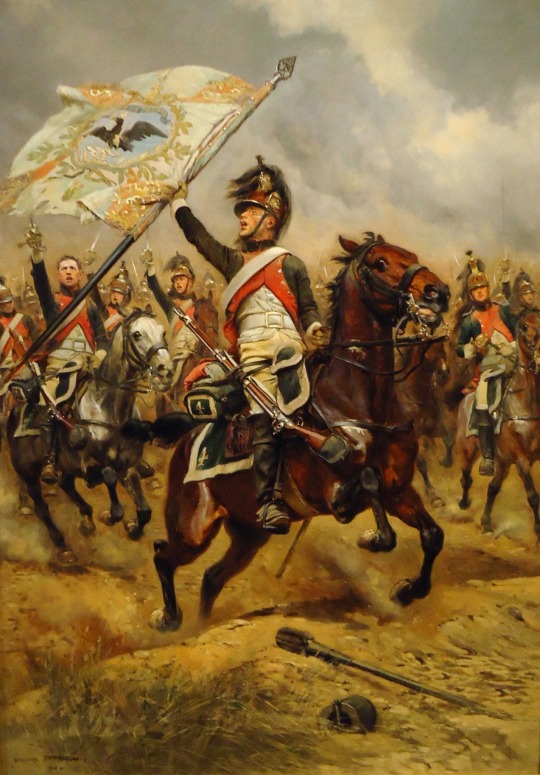
Le Trophée
French dragoon with captured Prussian flag at the Battle of Jena-Auerstedt, 1806
by Jean Baptiste Edouard Detaille
#art#painting#history#france#empire#napoleonic#napoleonic wars#dragoon#french dragoon#prussia#prussian#flag#jean baptiste édouard detaille
44 notes
·
View notes
Photo
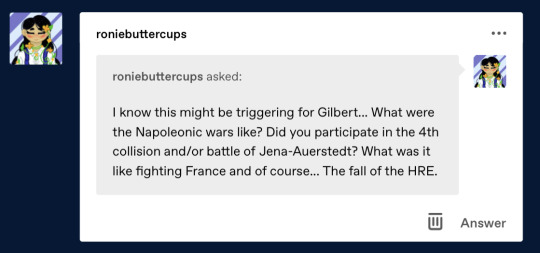
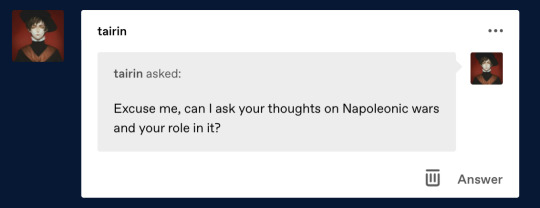
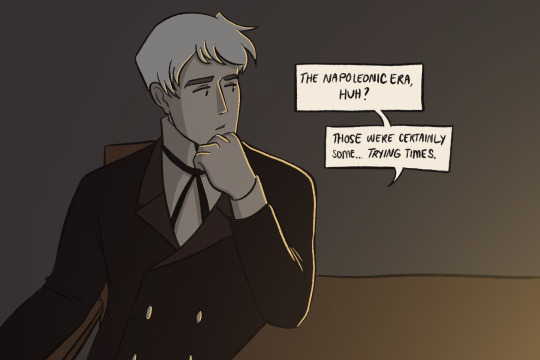
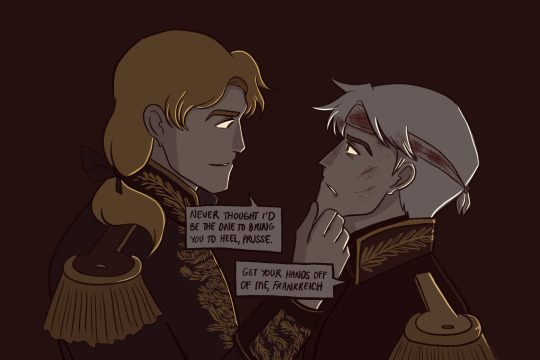

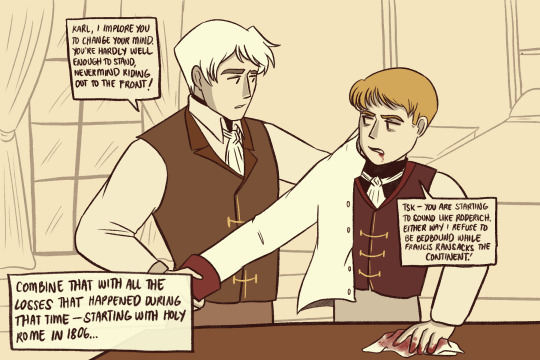
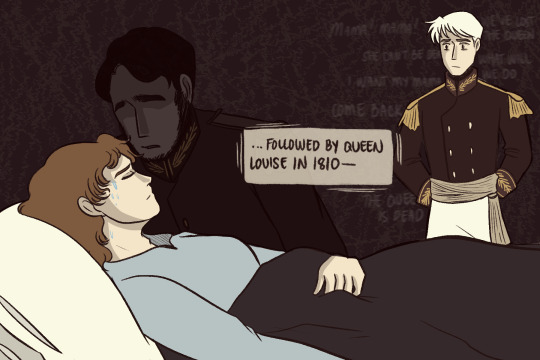
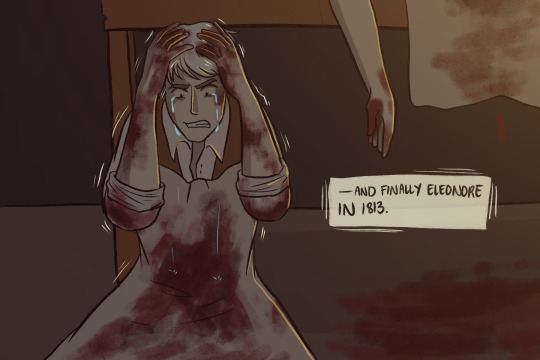
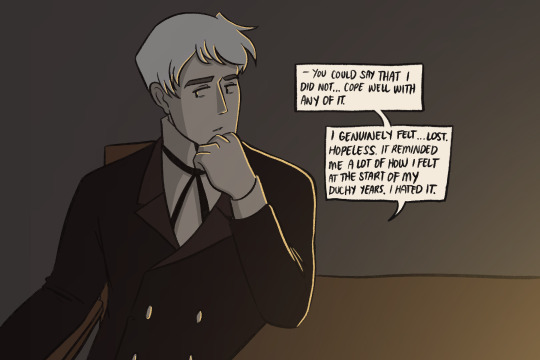
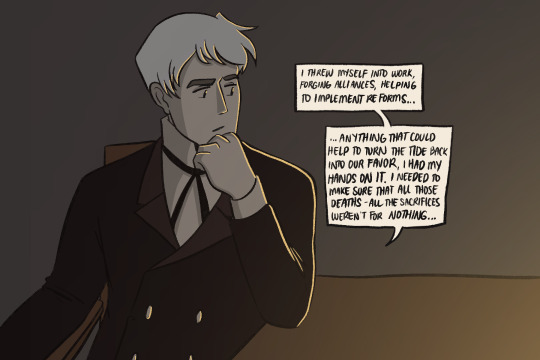
“In the end, we came away with the victory and enjoyed a long stretch of peace for decades to come; peace that I welcomed and was content with. Though I will admit — It wasn’t until recently, at the end of the Franco-Prussian war, that I finally felt like I’d finally repaid Frankreich in spades for what he and his emperor did to me, my family, and my people.
It felt good.”
Thanks to @ronniebuttercups and @tairin for the asks!!
Just a few headcanon notes under the cut! (TW: Drug abuse, depression, and suicide)
Gilbert does talk about the reforms and while later down the line he was very supportive of these, in the beginning he was actually among the people who were quite content to leave things exactly the way they were during the reign of Frederick the Great. This way of thinking caused the once great Prussian army to become outdated compared to others, most notably the French army under Napoleon (and to add insult to injury I remember reading that Napoleon studied Frederick’s tactics so there’s no way they could surprise him if they were still operating with those) which, coupled with Frederick William III’s indecisiveness, contributed to their disastrous defeats early on.
Jena-Auerstedt was one hell of a jarring wake-up call for Gilbert. While he was happy to relish in memories of the glory days and keep wearing the laurels Frederick had crowned him with, he failed to recognize that he was falling out of step with his rivals. To him it felt like a very grim reminder of his defeat at the hands of Poland in Lithuania at the Battle of Grunwald in 1410. His pride almost destroyed him back then and at that very moment he realized that he was letting the same thing happen again — He could lose everything that he built so far, everything that was laid out for him and given to him, all because he’d grown too confident and comfortable. This generated a lot of disappointment and anger at himself (with Francis being used as a convenient target for the latter) but also a steely determination to set things right before they get worse.
All the deaths that happened in quick succession really did a number on Gilbert’s mental health. After Frederick’s death in 1786, he was prescribed laudanum by his physician to help with his depression-induced insomnia. The stress of the war and all the deaths of people he considered close to him made him abuse the drug to the point that he developed a strong dependency on it, relying on it to keep himself rested at night and his mood stable during the day. He tried his damned best to keep the drug habit under wraps and chalked up any out of character outbursts and restlessness to stress and not getting enough sleep. And when he’s not knocking back laudanum he’s just drowning himself in work, which isn’t much better.
This will all catch up with him post-war, especially when there’s nothing left for him to distract himself with since the war is over. I’ve mentioned in a previous headcanon that Gilbert has made two attempts on his life, once in his Duchy years and the other post-Napoleonic era. Reiner and Konrad found him, though when he came back around, Gilbert insisted that the laudanum overdose was an accident and not intentional. It did get him to come to terms with the fact that he had a problem and set about to try and get himself clean. By the time Ludwig woke up and was under his care, he was (mostly) doing better.
#answered#ask19thcenturydoctorgilbert#Hetalia Ask Blog#aph prussia#hws prussia#gilbert beilschmidt#APH France#hws france#francis bonnefoy#aph hre#hws hre#APH Holy Roman Empire#suicide tw //#depression tw //#drug abuse tw //#blood tw //#death tw //#tldr; gilbert was not in a good mental emotional or physical state at all
161 notes
·
View notes
Note
for the meme thing: france?
how i feel about this character
I'VE LOVED HIM SINCE 2012! i enjoy most shades of his characterizations whether that's as the perverted comic relief, the over-the-top suave bisexual, the napoleonic era capital J Jerk™, and the modern day EU girlboss. he is just such an enjoyable character.
all the people i ship romantically with this character
oh my god there are a lot. arthur, of course. back in 2012 i didn't even care about gerita but i loved fruk with my whole heart lol. longtime rivals with benefits my beloved <3
i also love francis with ludwig. their dynamic as EU work husbands is... i don't wanna say underrated, but it definitely still has a lot of untapped potential. i mean, come on. f.rance tied their and g.ermany's economies together so intimately and with the rest of the EU + stubbornly volunteered and upheld itself as the primary military power of this alliance so that g.ermany could never surprise them again. darling, please focus on your cars and electronics and never pick up a gun again. i will protect myself from you by being the one to defend you from any threat. and ludwig with his luxury cars and electronics and having not stepped on a military base for years now is like thank you, this is nice actually :). francis domesticated him.
then there's prufra. they absolutely, 100%, had a fiery passionate fling throughout most of the 18th century that ultimately ended in one last emotional hate-fuck after the battle of jena-auerstedt I WILL DIE ON THIS HILL. one day i will fully write out that ridiculous fic i have in my drafts that parallels gilbert and francis with frederick the great and voltaire and then you'll all see.
and finally, where the fuck would i be in my life without frus. guns and roses. they are the ultimate romcom couple with endless culture clashes, disastrous dates, and earnest but horrible gifts given (mostly from alfred). with their personalities, a romance novel practically writes itself! francis, who has a wealth of relationship experience and is concerned with the romantic and the sensual and the delicacies of intimacy, falling for the macho, socially blunt and clumsy alfred who thinks relationships can be studied and optimized like ballistics.
i have more ships (like frain and franada) because francis is an endlessly shippable character, but those above are my main ones.
my non-romantic OTP for this character
kiku!!! love love love all those doujins and comics where francis is a big weeb and he and kiku bond over that. they have sleepovers where they watch hentai and critique it like high art. kiku shows him comics with shibari and tentacles and francis is like ah yes they were clearly influenced by marquis de sade. i also like francis, kiku, and alfred together as a platonic trio.
my unpopular opinion about this character
there is not enough portrayals of him as a serious colonizing and imperialist asshole. napoleonic era france especially in my opinion gets off way too easy in this fandom. give him the arthur and alfred treatment; he deserves it.
one thing I wish would happen / had happened with this character in canon
francis is actually one of the few characters in hetalia whose potential i think is explored with a breadth of complexity. i'm happy as long as hima keeps giving us francis as the asshole mother hen of the EU, tbh.
6 notes
·
View notes